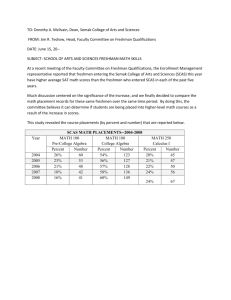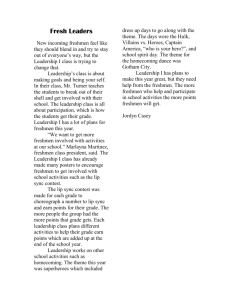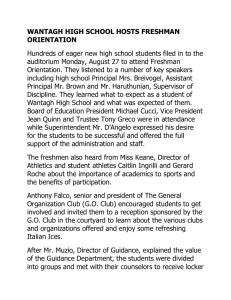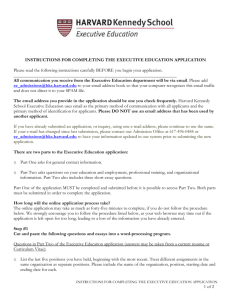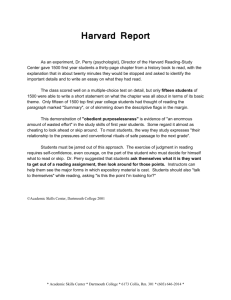Exercise Four – Reading – Using books
advertisement
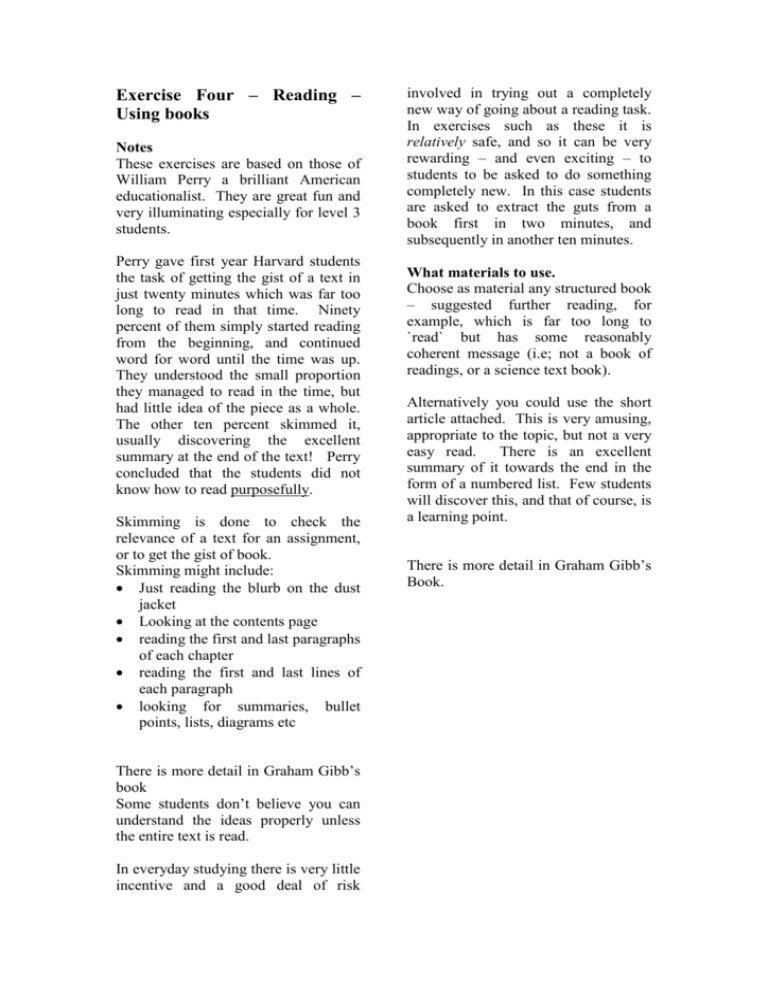
Exercise Four – Reading – Using books Notes These exercises are based on those of William Perry a brilliant American educationalist. They are great fun and very illuminating especially for level 3 students. Perry gave first year Harvard students the task of getting the gist of a text in just twenty minutes which was far too long to read in that time. Ninety percent of them simply started reading from the beginning, and continued word for word until the time was up. They understood the small proportion they managed to read in the time, but had little idea of the piece as a whole. The other ten percent skimmed it, usually discovering the excellent summary at the end of the text! Perry concluded that the students did not know how to read purposefully. Skimming is done to check the relevance of a text for an assignment, or to get the gist of book. Skimming might include: Just reading the blurb on the dust jacket Looking at the contents page reading the first and last paragraphs of each chapter reading the first and last lines of each paragraph looking for summaries, bullet points, lists, diagrams etc There is more detail in Graham Gibb’s book Some students don’t believe you can understand the ideas properly unless the entire text is read. In everyday studying there is very little incentive and a good deal of risk involved in trying out a completely new way of going about a reading task. In exercises such as these it is relatively safe, and so it can be very rewarding – and even exciting – to students to be asked to do something completely new. In this case students are asked to extract the guts from a book first in two minutes, and subsequently in another ten minutes. What materials to use. Choose as material any structured book – suggested further reading, for example, which is far too long to `read` but has some reasonably coherent message (i.e; not a book of readings, or a science text book). Alternatively you could use the short article attached. This is very amusing, appropriate to the topic, but not a very easy read. There is an excellent summary of it towards the end in the form of a numbered list. Few students will discover this, and that of course, is a learning point. There is more detail in Graham Gibb’s Book. ‘Imagine you are about to attend a tutorial on this text. You only have two minutes to check out what it is about before the tutorial starts. Off you go! ` Working in pairs (10 min.) ‘Share your understanding of the book. What were the best ways (and the worst ways) of gaining that understanding? Did your initial oneminute scans affect the way you used the book? Elect a chairman who notes down good ideas about understanding the book the book quickly.’ (2min.) `Ok, now write down what you think the book is about – as much as you have gathered in your two minutes. Don`t “cheat” by looking back at the text. Working in fours (15 min.) ‘Each group in turn, explains one good way of getting to grips with the book in a short time. Did other groups use those methods?’ Working in pairs (5-10 min.) (Take 5 minutes for a short article and 10 minutes if you have an entire book.) Compare what you have written down, and compare how you found it. Do you think you’ve got to the heart of it? Don’t “cheat” Working in plenary (10 min.) Continue till items are exhausted. Instructions Working alone (2 min) (2min.) I’m going to give you another five/ten minutes, now, to make what you can of this text, but Before you start, just suggest a few “plans of action” to each other. How are you going to tackle it? Working alone (5-10 min.) ‘OK, you are going to have to explain what you think the text is about to a different person after you’ve had five/ten minutes to work on it. Off you go.’ Working in pairs (10 min.) ‘Form pairs with someone different. Taking it in turns, one of you explain to the other what you now believe the text to be about. How did you gain that understanding? Do you both look at the same parts of the book?’ Materials (for an exercise on the reading of short articles) ‘Students’ use and misuse of reading skills’ by William Perry* Mr President, twenty years ago this Faculty undertook an experiment to see if some of its students could be taught to read better. Since the Faculty was then something of a pioneer in such an enterprise, it would seem appropriate that it should receive, after two decades, at least a report of progress – the more so because the work now concerns not the correction of disabilities of a few students but the direction of the abilities of a large proportion of the freshman class. The students of this college are reputed to spend a good deal of time reading. In fact, a student sits with his books for nearly a thousand hours each year. The Faculty has a deep concern that these hours be fruitful. This concern is evident in the wording of assignments, in the layout of instruction in each course, and in the conversations of teachers with their students. It was this same concern that started the original experiment in reading improvement in 1938. The experiment began with a rather mechanical emphasis. It consisted of an instructor, whose main job was to run a projector for the first Harvard Reading Films, and some thirty student volunteers, hopefully the worst readers in the freshman class (and at that time there apparently were some freshmen who for Harvard’s intents and purposes found it hard to read at all). The class met for about 18 to 20 sessions and engendered enough Perry, W. ‘Students’ use and misuse of reading skills’, Harvard Educational Review, vol. 29, 1959. Copyright 1959 by President and Fellows of Harvard College. * enthusiasm to become, like many and experiment, a kind of annual fixture, this one known as the Remedial Reading Course. Each year freshmen as they arrived in the fall would take a reading test and those who scored lowest would be informed of their plight and allowed to volunteer for the continued experiment. When the Bureau of Study counsel took over the actual instruction in this course in 1946, we met with thirty depressed –looking volunteers one evening in a basement class-room somewhere. Not knowing really what we were up against, we gave them still another reading test of a standard sort and discovered that every single one of them could score better on this test than 85% of the college freshmen in the country. We felt that to be useful to these people in their genuine dissatisfaction we were going to have to take a new look at the reading improvement game. We therefore abandoned the word ‘Remedial’ for the course and upgraded the material until it could jar the teeth of the average graduate student. Then we threw the doors open. The amount of enthusiasm that exists in this community to read better – or if not better, then at least faster – is evidenced by the fact that we son found ourselves with nearly 800 people enrolled in the course. When we examined the roll, we found that we had some 400 freshmen from Harvard and Radcliffe, 100 upperclassmen, 230 graduate students from the various schools, especially that of Business Administration and two professors – from the Law School. Although multitudes the budget to feel this the fees paid by these looked very attractive on of a small office, we came was stretching our energies too far. We have subsequently cut the class in half and have been trying to make some sensible systems of priorities whereby we might offer first chance on seats to roughly that third of the freshman class that might be most likely to benefit from this kind of instruction. In trying to find our who these people might be, awe have turned up some observations about freshmen which may be of interest to the Faculty. One wonders first of all why students who read, on tests, as well as these do, should want to attend a reading course at all, much less one that meets daily at 8 o’clock in the morning. Of course a number come in hope of magic – some machine they’ve heard of that will stretch their eyes until they can see a whole page at a glance. This is understandable. Freshmen are deprived rather abruptly of the luxury of thinking that reading is something they can finish, and are confronted instead with an infinite world of books in which they sense that they may forever feel behind, or even illiterate. But year by year it has become more apparent that what the students lack is not mechanical skills but flexibility and purpose in the use of them – the capacity to adjust themselves to a variety of reading materials and purposes that exist on a college level. What they seen to do with almost any kind of reading is to open the book and read from word to word, having in advance abandoned all responsibility in regard to the purpose of the reading to those who had made the assignment. They complain consequently of difficulty in concentrating and feel that they have ‘read’ whole assignments but are unable to remember anything in them. We have therefore shifted the emphasis of the reading course away from mechanics over to an effort to shake students loose from this conscientious but meaningless approach to their work. We have that if they can be persuaded of their right to think, even though reading, they can then develop a broader and more flexible attack on the different forms of study and put their skills to meaningful use on long assignments. In offering freshman priority on seats in the course, therefore, we have naturally wanted to know about their flexibility and their sense of purpose in reading. This is a hard thing to measure. To make some estimate of it we designed a reading test – as reading test go it may be rather peculiar – and presented it to the freshmen of Harvard and Radcliffe when they arrived this September. We suspected the students might learn more from it than we would, but this seemed a legitimate chance to take. I should like to describe this test and tell you what the students did with it. First of all, instead of the usual short passages which appear on reading tests, we presented students with thirty pages of detailed material – a complete chapter from a history book. We asked them to imagine they were enrolled in a course entitled The Growth of Western Institutions. We asked them to picture themselves sitting down of an evening to study one assignment in this course – this chapter entitled “The Development of the English State, 1066-1272”. They were to suppose that they had two hours ahead of them for this work, but that after all, they still had their French to do and some Chemistry to review before they went to bed. At the same time, they were to imagine that in this course an hourexamination would be give in about a week on which they would be asked to write a short essay and to ‘identify’ important details. We told them to go ahead about their reading in whatever way they thought best and to take notes of they wished. We told them this was a test of what they derived from the early stages of their study of regular assignments and that in about 20 minutes or so we would stop them and ask them questions appropriate to their particular method of work. We then turned them loose. Twenty-two minutes later we stopped them and asked them what they had been doing. If they reported that they had been reading from the very beginning and going straight ahead into the chapter – whether rapidly in the first reading, or carefully with a more rapid review in mind – we gave them regular multiple-choice questions on the chapter as far as they had gone in it. Up to this point the test was fairly standard, and we can report that the cast majority of the students, over ninety per cent of them in fact, reported that this was exactly what they had done. We can report that their rate of work in this particular approach was astonishing and their capacity to answer multiple-choice questions on detail was impressive. Some of them had read as many as twenty pages of very detailed material and were able to answer accurately every sensible question we could ask them about the detail. The freshman class – as far as we could see – of both Harvard and Radcliffe, consisted of a most remarkable collection of readers – in the narrow sense of the term. The showing is most remarkable because, of course, these ninety per cent of the class were going at this chapter in the hardest way imaginable. Let me explain what I mean. The chapter in question is an admirable piece of exposition, but like may admirable chapters it makes no initial statement of its aims, and it takes a little while to get going. And as a consequence, the reader begins at the beginning with the Battle of Hastings and reads word by word is likely to find himself at page three hopelessly bogged down in the shires, the hundreds and the marches of AngloSaxon England. And after ten minutes or so, this was just where the students reported themselves to be. What were interested it determine was how many students in the face of this burden of detail, the purpose of which was not clear, would have the moral courage – or should we call it the immoral courage – to pull themselves out and look at the ending of the chapter. Or even to survey the entire marginal gloss set out like sign posts page by page. The very ending has a bold flag out beside it which says – ‘Recapitultion’. As a summary paragraph we doubt that we have ever seen a better one. From a half minute study of this paragraph the whole development of the chapter becomes immediately clear to a reader and puts him in a strong position, not only to select among details as he reads them, but also to remember, for their meaningfulness, the details he would need to support and intelligent discourse. Out of these 1500 of the finest freshmen readers in the country only 150 even made a claim to have taken a look ahead during twenty minutes of struggle with the chapter. And the vast majority of these seemed to have looked ahead only to determine how long the assignment was. We asked anyone who could do so to write a short statement about what the chapter was about. The number who were able to tell us in terms that had something to do with the growth of institutions, was just one in a hundred –fifteen. As a demonstration of obedient purposelessness in the reading of 99% of freshmen we found this impressive. We had been looking for one-third of the class most in need of our beneficent instruction and we had found just about everybody. We tried to find out if the students gad behaved this way simply because it was a test – they reported no, that they always worked this way. When we pointed the ending out to them, some said ‘You mean you can sometimes tell what a chapter is about by looking at the end’ and others said, ‘O Lord, how many times have I been told!’. Told or nor, after twelve years of reading homework assignments in school they had all settled into the habit of leaving the point of it all to someone else. We knew from our own efforts to teach independence of approach in reading that students find it hard to hear us even when we ask the sheer bulk of college work could be handled in no other way. And we supposed that school-teachers had an even harder time of it. We were therefore prepared to find this widespread passivity of purpose; we wished to go beyond this and to identify those students whose misconceptions of reading involved something worse, so at variance with the goals of Harvard that they might be especially slow at learning from their college experience. We had therefore added another turn to our test. We asked students to imagine further that in their imaginary course an examination had been given on which an essay question had appeared. This question (which we hoped was a proper-type Harvard essay question) reads: ‘From 1066-1272, the Norman and Angevin Kings laid the foundations of English self government both by their strengths and by their weaknesses’. Discuss. (Twenty minutes). We then presented them with two answers, purporting to have been written by two students. The first of these was a chronological reiteration of the chapter by a student with an extraordinary memory for dates and kings and no concern for the question (or for any intellectual issue at all, for that matter). We calculated that no instructor with a shred of compassion in him could give this answer less than a C-even though it might deserve less. The second essay answer, shorter, and with hardly a date in it, addressed itself stringently to the issues posed by the question. We supposed this answer to be worth a B+, or perhaps an A-to a relieved instructor. In validating the test, we had then begged the assistance of the chief section man in a real course, not wholly unlike this imaginary course of ours, and asked him to grade essays. Of the first, he said that he really couldn’t give the student a D because he had worked so hard; of the second we were pleased to hear him say that this was obviously an A student, even though all he was going to get out of this essay was a B+. To the freshmen, then, we presented on the test these two answers without reporting their value and asked them to state which of the essays was the better, which the worse, and to give their reasons. We are happy to say that on this they did quite well. Only two hundred students graded the better essay the worse, and only two hundred more gave the wrong reasons for the correct grading. This means that, on this particular measure, only a rough third of our freshmen showed themselves to be headed toward the wrong goals. Very possibly, were this same test to be given a year later in the year, the percentage would be much less. But we have experience to support that the tendency persists – often tragically. These then were students to whom we turned our attention. Until such students revise their sense of purpose of reading in increase effort is likely to produce only worse results. Oddly, we have as yet found nothing else to distinguish them form other people. The number of them who come form public schools as against private schools is exactly the same as for the class as a whole, and they are by no means the least intelligent members of their class. We are eager to find if we can learn more about how they get their misconceptions. We hope that the Reading Course may help to turn some of them around. Perhaps the test itself helped; the section man who helped us with the test was quick to point its instructional possibilities, and we gave the text and essays to the students to take with them, together with them, together with a page of comments. It was encouraging to have to thread one’s way afterwards through knots of students working over their papers. What might the faculty conclude from all this. As the faculty’s agent in this area, I can report my own conclusions from this twenty year experiment. 1 It appears that most students can learn to read better. 2 The instruction that assists them to do so does not centre in the mechanics of reading. The mechanics of reading skill are inseparable at this level from the individual’s purpose as he reads. If you train someone in mechanics alone, he drops right back into his old habits the minute he picks up an assigned test. 3 The possession of excellent reading skills as evidenced on conventional reading tests is no guarantee that a student knows how to read long assignments meaningfully. The fact that the Admissions Committee is providing students to higher and higher ability should not lull the Faculty into feeling that at last it does not have to teach students how to study. In fact the responsibility is only the greater, for these students have the ability to muddle through assignments the wrong way and still get that wretched C-. 4. There can no be general rules for teaching the exercise of judgement in reading. Such judgement requires courage, and cannot be taught by rule, it can dared, or redirected, in way appropriate to particular subjects and learning tasks. To be sure, the reading of conflicting authorities is a fertile ground for young courage and an excellent exercise in reading skill. And a C- for the attainment of useless knowledge is perhaps less of a kindness in the long run than congratulations for effort and a clean E for expending it in the wrong game. However, the individual instructor in his own course remains the best judge of how to set up his assignments so that they demand a redirection of effort towards effort and away from ritual. 5. A short separate course of general instruction, like the reading class can be of some contributing value, if only because it offers a moment’s freedom to experiment without the treat of failure. But limits are very clear. In such a course we can only dramatise the issues, and this only in the area of very general expository reading. We can refer only briefly to science and must leave literature explicitly alone. We feel, too that only a narrow line of sprit divides such instruction from an invitation to mere gamesmanship. We sometimes worry in teaching method without content, lest students gather that we recommend a glance at the ending of chapters and at nothing else. (We do dare students to suppose that even this is sometimes appropriate.) I should like to be able to report, in conclusion, that when we do succeed in introducing students to the rigots of thoughtful reading they are invariably grateful. I must confess, a bit ruefully, that this is not always the case. I have here a description of this kind of instruction in a student’s words. To assist us in developing the course we have occasionally given the students a questionnaire at the end, and this one of a year or so ago was a real up-todate Social-Science-type, questionnaire: open ended at the beginning, pointed at the end, and all. It says here, ‘ what do you think about it now? Big space. On the other side a lot of specific questions. We did not ask students to sign their names, only to enter the scores they made at the beginning and end of the course. This student’s scores when he came to the course showed him to have derived only a D- kind of understanding from considerable study of the material. At the end he was obtaining a straight A understanding in one-third of the time. I remember settling back with this one in anticipation of those comments that a teacher so loves to hear – but not at all. He was furious. ‘What did you expect when you came to this course?’ I expected an organised effort to improve my reading.’ What do you think about it now? This has been the sloppiest and most disorganised course I have taken. Of course, I have made some progress, but this was due entirely to my own efforts……’

